Barbara Rainey's Blog, page 22
August 26, 2021
Friends & Family Fridays #8

The end of August is my favorite time of year.
It’s always like standing in the threshold of an open door looking with anticipation into the coming months. I admit it’s about the weather, but coolers temps are only a signal of coming seasons that always feel welcoming to me.
Minnesotans get cabin fever in the winter. I get cabin fever in the summer. And the beginning of September means I’ll be cured of my annual summer claustrophobia!
In late July Dennis and I had planned to leave to celebrate our granddaughter’s first birthday and then head north for a working vacation for most of the month of August. It’s a long story but first Dennis got Covid, even with the vaccine, then the baby and her brother got sick and the party was cancelled. We waited at home for Dennis to feel well enough to travel and on Monday August 2 he decided he finally felt like driving. We left at noon for Montana. Early on we had decided to drive; the delays in departure proved God was leading even though we didn’t know it at the time.
Four days later we arrived at the ranch of our friends to stay in the bunk house of their barn for three weeks. My goals were to read a lot, write a lot, walk or hike at least daily and paint something every day. Not full final paintings, but lots of sketches and small studies. Most days I took photos of the beautiful mountains, hills and landscapes all around our retreat. Those photos became my subjects. My soul needed this and it was good.
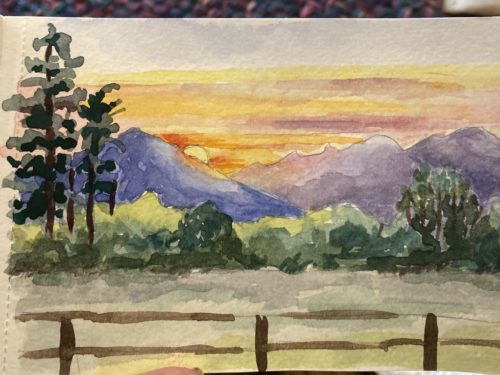
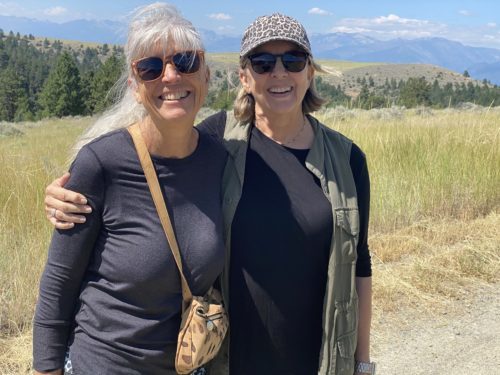 Thanks Randy and Kay for the great time we had with you and your family on your ranch!
Thanks Randy and Kay for the great time we had with you and your family on your ranch!During the last week August we drove to Denver to spend time with our two kids who live there and then as this post arrives in your inbox we will be driving home from Montana grateful for time with our two kids and their combined 10 children, our friends’ generosity in hosting us at their ranch, and for the goodness of God for giving us this much needed break.
As I look to the fall here are a few things I’m excited about:
Attending the rescheduled first birthday for Emma Cate.A new ebook on gratitude coming in October. Our first one was sent in early August and if you didn’t see it or meant to download it and forgot, here is the link. And don’t forget to share it with others. We need to encourage one another in our marriages.Starting seminary. My first class will be a bible study methods class and the professor is the president of the seminary. He’s such a good man and though I know him through Dennis’s board work I’ve never heard him teach so I know this will be a great treat for me. I’m also looking forward to sharing what I’m learning here with you as several of you have asked.The return of in-person events. We will be speaking at the Christian Alliance for Orphans Summit in mid-September. If you don’t know anything about this organization go check it out at Cafo.org. It’s an organization united to help orphans, foster care children and their caregivers here and around the world.We’ll be babysitting one weekend for our grands so our kids can get away for a 40th birthday trip.I’ll soon be buying pumpkins and mums to start decorating for fall. I planted some mini pumpkins so I’m eager to get home and see if I have any growing. Lots of blooms when I left home so I hope some turned into pumpkins!And I’m looking forward to sharing some of the new topics I’ve been writing on this summer. So watch the blog for great content for you, friends, sisters, daughters … anyone who knows Jesus and wants to grow more deeply in Him.Here are a few photos from our days in Montana. It was really smokey for most of the days but even that made for amazing sunsets.

 Look closely to see the mountains! So much smoke.
Look closely to see the mountains! So much smoke.

Welcome fall everyone!
Barbara
The post Friends & Family Fridays #8 appeared first on Ever Thine Home.
August 23, 2021
When God Asks You to Do Something You Don’t Want to Do


Dear Barbara: I’m struggling right now. I really feel God asking me to do something that sounds too hard. Honestly, I don’t want to obey. Why would He do that? How can I negotiate?
Dear Friend,
It’s scary isn’t it? I’ve wondered the same.
I remember when, after an exhausting week wrangling five relentless children, I started feeling a little off. It’s sleep; I need more sleep, I thought. A short rest during their down time didn’t help at all. It’s food; I need a snack, I thought. An apple dipped in peanut butter might help, but it didn’t.
Something wasn’t right.
I didn’t want to admit it, but my mind began to panic. I had Dennis pick up a pregnancy test on the way home from work. I cried for three days when I discovered the answer. I wasn’t feeling off; I was pregnant.
“God, I don’t want to do this again!” God was asking me, telling me, making me be a mother for a sixth time. Really? I felt I had obeyed God enough with my womb, pregnancy was difficult for me, and I wanted my body back. Five was what we’d agreed to. Happily, I thought we were done, all baby gear sold at a garage sale. I was free!
But now God was asking me to die to self. Again.
Several years earlier, God asked me to do something else I didn’t want to do. With His characteristic gentle whisper to my heart, He asked me to shelve my art supplies and my dreams of painting for commission. Instead, He wanted me to invest my energy and talent cooperatively with Him in creating beauty in my children.
It was a death to self. I wasn’t sure God would ever return my paints, but I knew He knew what was best for me. In my obedience, I trusted His love and plan for my life.
It was hard to put my desires aside. I couldn’t imagine why He’d tell me to box up those hopes and stuff them on the shelf. Bury my talents?
But I did it anyway.
At first, in both of these seasons, I saw only what I was missing, what had been taken away. Death is like that. The loss of a dream or a hope brings grief, which must be acknowledged. No sense pretending we are always happy about God’s plans and His impeccable timing that never seems to match mine.
I focused on life not going the way I wanted it to. I grieved not getting what I had planned. But then I reminded myself of what I knew to be true about God. He loved me and was at work in my life for good … always for good. Philippians 1:6 tells us, “He who began a good work in you will bring it to completion …” I chose to trust my Father in Heaven who rules with wisdom and purpose.

I know it’s true for me because it has been true throughout time. It’s perfectly illustrated in a Bible story most of us know. Jesus was walking along and noticed a man who was blind from birth. I love that Jesus saw him when the man couldn’t see Jesus to even know He was near. He sees us, too, when we aren’t looking for Him.
John 9:2 tells us the disciples’ first thought was whose fault is his blindness? Don’t we do that too? We see a handicapped child and wonder about the mother’s prenatal care or their home life. How many times do you think the blind man’s mother secretly wondered what she had done to cause and deserve this?
She’d been heartbroken and afraid at his birth, yet with the tender compassion God has given us women she reached for her newborn son, holding him near, consoling his cries. Like us, she experienced a death as she received this gift of God to her.
Jesus answered for all of us who have had expectations dashed, “It was not that this man sinned, or his parents, but that the works of God might be displayed in him” (John 9:3).
For 38 years this man lived blind. For 38 years his parents suffered this loss. Thirty-eight years puts it in perspective. Why would God ask me to do something I didn’t want to do? Why would I choose to obey anyway? When it felt uncomfortable. When it felt inconvenient. When it felt impossible.
Because the work that God wants to do in us is always heart work. And always He has purposes and plans we cannot see or know.
The question for me and for all of us is: Will we trust Him?
Years of living have taught me that the unexpected is always an opportunity to experience more of who God is. When I finally stop focusing on my losses—and there have been many—I’m ready to see God begin to work His higher purposes.
My pregnancy with baby six was not easy, just as I’d feared. My feelings were all over the map in those months, too. But feelings are not the end, dear friend. Feelings are fair and valid. But feelings must be surrendered to God’s design and direction.

When I took my eyes off myself and glanced up, I saw a good God, a safe God I can say yes to, no matter what He’s calling me to. And you can too.
Instead of groaning over my lot in life and comparing it away, I can do as Jesus commanded Peter in John 21. Jesus had just given Peter the responsibility of feeding His sheep, and Peter’s response was “But Lord, what about this man?” implying, what does HE have to do for you? Jesus gently replied, “What is it to you? You follow me!”
Let’s fix our eyes on Jesus. Let’s run hard and fast, courageously toward what He asks us to do. Let’s just trust that God knows what He’s doing, and choose to embrace it by faith.
And by the way, baby number six, though a sinner like us, has been a delight since the day God gave her to us. His ways are best.
The post When God Asks You to Do Something You Don’t Want to Do appeared first on Ever Thine Home.
August 20, 2021
From Barbara: Dear Reader


Thanks everyone for some really good questions you sent in response to my Friends and Family letter on July 30th!
I love the varied generations of my readers, so here are two very different questions—one from a grandma and one from a young mama of two little ones. For these two women, and I hope many others of you, here are my answers … brief, honest, and hopefully helpful as we grow together in Christ.
From Catie:
Thank you for your encouragement and honesty. Since you asked for questions here is mine: I have a 12-week-old and 20-month-old and am returning to work full time this week. My husband is finishing his PhD so I currently do not have the option to stay home, which is what he and I both hope for in the future.
During this season I want to raise my children to love and know Jesus, and I want to love my husband and grow in oneness with him, manage our home to God’s glory, love our neighbors, and work faithfully at my job. Yet, I do not know how to balance all of this well. I would love to hear how you did this with kids (we also hope to have a large family) … faithfully serving the Lord and obediently engaging with the tasks and relationships He set before you.
Sweet Catie,
I’m proud of you for wanting to live for God’s glory. I have lots of thoughts and wish we could have coffee and chat. But for now here are some comments and questions for you to think through, plus a couple book recommendations for you.
First, I want to encourage you to let go of the pressure you feel to balance all the things you listed. You can’t do it all and you’ll only feel like a failure if you try. You really only have three responsibilities: loving God, loving your husband and loving your children. Serving your neighbors and your job are secondary. Not that you should perform poorly at work and insult your neighbors. The best way to balance life in any season is to make sure you invest first and consistently in those three important relationships.
Here are a few questions for you to consider and pray about:
Could you evaluate your current job and work with your employer to find a creative way for you to work with flex hours, do more of your job at home, or do some of your work in the evenings after the littles are in bed?Have you and your husband considered a more modest living situation so that you can be with the kids more? A temporary downsize would be worth the time you’d gain with your two precious children.Are you willing to look for another job that would allow you to be at home with your two little ones?This is a great opportunity for you, Catie, and your husband too, to watch God work in remarkable ways to provide for both your financial needs and for the best care for your children. It’s also an opportunity for you to grow in learning to hear God speak to you specifically. If this is new to you, here are a couple blog posts I’ve written about the Holy Spirit that might be of help:
“How Does the Holy Spirit Speak to Me Personally?”“How Do I Know It’s the Holy Spirit? 5 Ways to Recognize God’s Voice”God cares about your little ones more than you do and He designed them to be raised by you first and foremost. Because you have that God-given desire, I believe God wants to help you fulfill that calling. One book I recommend is a deeply researched look at the first three years of a child’s life: Being There: Why Prioritizing Motherhood In the First Three Years Matters, by Erica Komisar. I believe it’s very significant and I wish every young mom could read it. Also I recommend The Ministry of Motherhood by Sally Clarkson as well as her other books. And I also suggest our book, The Art of Parenting, which covers everything you’ll encounter from toddlers to teens.
Hope this helps. May God provide in ways only He can and may you give Him the praise as you watch Him work.
From Jackie:
I’m a babysitting grandma who sometimes gets taken for granted and bears the verbal outburst of a stressed-out adult child when I’m not available to babysit or didn’t exactly follow their protocol. It hurts.
I feel we grandmothers realize the financial struggle it is today to raise a family, but has that ever not been an issue? If you have any help on this, I’d be grateful and so would a few others.
Thanks for asking, Jackie.
Generations are different for sure but what we so often can’t see is that both get hurt easily because we love each other more intensely and have higher expectations than we do with friends. Remember that love is there between you and your adult child.
Moms always want our children to succeed at every age and stage of life. It’s in our DNA. So we sometimes continue to sacrifice ourselves for their benefit even to the point of enabling them. So dear Jackie have a conversation with your child and explain that you want to help but that you aren’t willing to be treated rudely when you can’t. Allowing your child to treat you as you describe is allowing this one to sin with no consequences and that isn’t healthy for either of you.
And if the anger at you is an ongoing pattern, then it’s abusive and you cannot keep tolerating it. You have a life, and your child needs to see you live healthy and godly because she will be in your shoes one day. You are still modeling.
Regarding following exact protocols, I suggest letting your child know you intend to do your best to follow the “rules” but you aren’t perfect and might not be able to do it all. Ask your child to prioritize the list so you are sure you do what matters most. And I must say, I hope you aren’t a gramma who listens to the schedules and details and then ignores them as if you know better. Your children will do things differently, and they will answer to God for those little ones not you. So when you respect what they are trying to do, even if you disagree on some points, you demonstrate you love them.
A good book that I think will help both you and your child as you work through the details of babysitting is Boundaries, by Henry Cloud. There are several books on this theme by the same author, but the original one is the best place to start. All relationships need boundaries that are understood and respected. We all flourish more when we know what we can count on.
Ask God to guide you as you insert some healthy boundaries into this relationship. And maybe in others too! And as you experience an improved relationship may you ask God how He wants to use you to help other grammas you know.
Barbara
The post From Barbara: Dear Reader appeared first on Ever Thine Home.
August 19, 2021
No Trouble at All
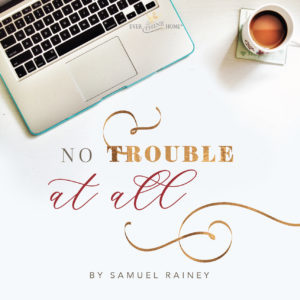
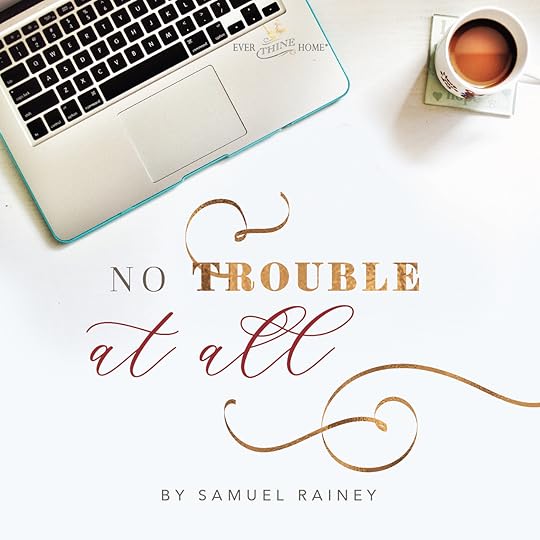
Note from Barbara: There is nothing like the love of a parent for her child. In June I listened to this child of mine, Samuel, speak at a Weekend to Remember marriage getaway and I cried with joy and wonder and pride at how wisely and clearly he and his wife whom I love, communicated the truth of God’s Word about marriage to an audience of over 400.
Today I feel the same joy in sharing with you a blog post Samuel wrote about the oft-used phrase in our American culture “It’s no trouble at all.” I admired his courage in his post and knew instantly he was right. Too often we use words and phrases without thinking about the meaning. I was challenged after reading his words to be courageous like my son and communicate with words that matter.
I hope you will read my son’s well-written post and that you too will evaluate not just this phrase but others that may populate your vocabulary. And I invite you to follow him on his blog, the Five Minute Sherpa, at SamuelRainey.com.
And if you or someone you know lives near the Nashville area and is interested in counseling or marriage intensives, check out this link. https://samuelrainey.com/counseling/couples-intensives/ .
Some time ago a friend asked me to help him sort through some technology issues with his phone and computer. My first career, and past hobby, was in technology so it came as no surprise that he’d asked for my help. After we’d finished the project, he said thank you and for the third time in that setting apologized for inconveniencing me. “Don’t be sorry, it was no trouble at all,” was my response.
I was a bit surprised by how quickly these words came out of my mouth. One of my pet peeves is when people apologize for things that need no apology. It wasn’t true. I’d taken time out of my day to help him with an issue that didn’t concern me. The truth was, it was an inconvenience. But it was an inconvenience that I was willing to give because I care about my friend. I wanted to help him. That’s what friends are for, right?
After realizing this wasn’t the truth, which wasn’t more than a couple of moments later, I corrected myself.
“Actually,” I said, “it was an inconvenience.” I paused to let those words linger for a moment and continued. “Saying otherwise isn’t true, nor is it honoring to you and our friendship for me to pretend it wasn’t a big deal. Me giving you some of me, my time and energy, is one way I’m able to show you that I value our friendship.”
This led to a completely different conversation about self-worth, value, and why it’s difficult to accept love/care from others. It was an amazing conversation that never would have occurred had we both remained “nice” towards each other, exchanging the normal platitudes and pleasantries of a proper friendship. I don’t want proper friendships, I want deep ones.
Our conversation highlights a challenge in relationships: Telling the truth about the small things in life is hard. “It’s no big deal…” is such a simple, polite, and well meaning statement that all of us have made to another person. Too often saying something isn’t a big deal sabotages giving the gift of sacrificial love.

Telling someone “you’re not bothering me,” or “It’s no trouble at all” communicates that the request they are making is easy for you to accomplish. Spoken in regards to a task or to-do list, perhaps “no trouble at all” has some truth to it (especially if the request of you is something you’re gifted at doing). The limitation of this statement is that we deny showing the other person their importance in our lives.
We’re selfish people by nature. We want what we want, when we want it. As we mature, it takes discipline and proaction to act contrary to this natural tendency. So when someone asks something of us, we have to sacrifice our selfish desires for the benefit of the other—this is love. It may be minor in the sacrifice, such as helping a friend with a technology problem, but it is still a sacrifice. In order for trust and relationships to grow, we need to know that someone is willing to sacrifice themselves on our behalf. Without this understanding and experience, we’re left to wonder if the other really sacrifices anything for us.
Letting someone know that we’re willingly choosing to sacrifice, be inconvenienced, and not hold it over their heads deepens relational intimacy. Little things piled together makes a big thing. Be proactive in your relationship to intentionally build a big thing of trust by celebrating the little things.
This post appeared first at Five Minute Sherpa.
The post No Trouble at All appeared first on Ever Thine Home.
August 16, 2021
Avoid This Mistake When Praying for Grown Children
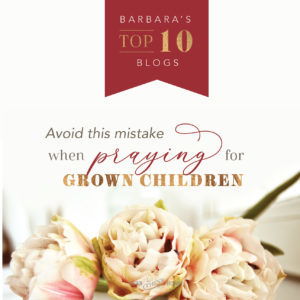
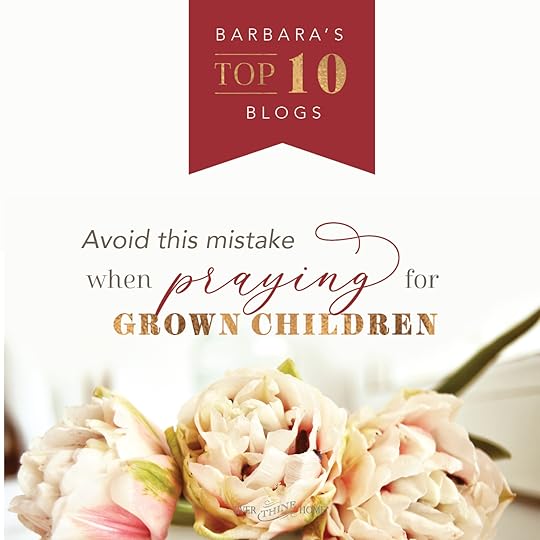
For years I avoided reading the book of Job because I was afraid I would contract some of his suffering. I knew enough about his story to have zero envy of the wealth and success he enjoyed before and after his period of suffering.
Then I spent a week focusing on Job for my Bible study class during my children’s teen years. I’m now a fan of his because of what I learned about God and about Job’s prayers for his grown up kids. The timing was right for me.
As any parent knows, endless frightening possibilities force us to pray. Teenage driving, coed parties, international mission trips, or carefree backpacking in national parks are out-of-our-control scenarios that send us to our knees.
When our six children left the nest and moved away, I discovered I wasn’t “in the know” anymore. I no longer heard daily accounts of my kids’ activities and events once they went to college and then married. I no longer knew their friends, where they were, when they left or arrived back home to their dorm or house.
It was a great loss … a time of learning to trust God in new ways as their mom. I learned to pray differently, now that I didn’t have details.
With 10 grown children, seven sons and three daughters, Job felt what every mom or dad feels today. The seven brothers hosted big feasts on their birthdays every year and invited the siblings, including their three sisters. Job wasn’t invited. But he knew they went all out with great food and fine wines.
Even though he missed out on the fun, Job developed a routine, a habit of prayer, to exercise when he knew the party was over and everyone was traveling back home. The focus of Job’s prayer was for the hearts of his children. Not their success, wealth, or accomplishments. His prayers weren’t selfish and temporal focused but were holy and eternally focused. Look at Job 1:5:
“And when the days of the feast had run their course … he would rise early and offer burnt offerings for the number of them all. For Job said [he prayed], ‘It may be that my children have sinned, and cursed God in their hearts.’”

Interceding before the Judge of the universe, Job confidently and faithfully went before God because as a parent he loved his children and knew it was best for them to follow God all their lives. My husband and I often pray prayers like Job’s for our grown up kids. We also bring other requests to God about qualities and values that line up with our Father’s:
“Lord, help them always be quick to forgive, quick to ask for forgiveness, willing to do the hard work of relationship building and relationship restoration.” (based on Ephesians 4:29-32)“Father, guide our children in your ways.” (Psalm 43:3)“Lord, give them wisdom and understanding as they make decisions on school choices, career choices, marriage, and parenting.” (Proverbs 2:1-11)“Protect them, Lord, from the temptations of the world and from the evil that wants to destroy.” (James 4:1-8)“May they be like Job … faithful to You, Lord, no matter what befalls them.” (Job 1-2)“Lord God, I pray my children, their spouses, and our grandchildren would grow to love Your Word with their whole hearts so they might remain pure.” (Psalm 119)But as you pray, here is an important caution: Ask your adult children for specific needs to pray about for them. And if they are willing to share those with you, don’t share those requests with others, even your prayer or Bible study group or friends. Once your children leave your home to live their own lives, their lives are their own to share as they wish with whomever they wish.
This is hard to learn for parents who, as their kids were growing up, found comfort at ballgames, church foyers, and prayer groups sharing challenges with other moms and dads with similar experiences. We found camaraderie, sometimes a few laughs, and encouragement that our kids weren’t the only ones doing something that drove us crazy!
But when they turn 18, the rules change.

Respect your adult children’s need to make their own way, to grapple with the issues, morals, and cultural complexities of their generation. Give them space to learn and grow just as you did.
Remember, we are on this spinning planet for His agenda and His purposes. As Job did, line up your prayers for your children with God’s desires. As Jesus taught us, pray, “Thy kingdom come,” a request for Him to reign in your children’s lives and your own.
For encouragement on teaching younger children to pray read Teaching your Elementary Kids to Pray and Teaching Little Ones to Pray.
The post Avoid This Mistake When Praying for Grown Children appeared first on Ever Thine Home.
August 9, 2021
Pestering God
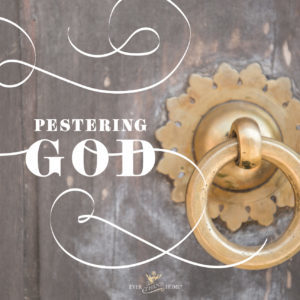

Too often I’m in a hurry and end up using my driving time to talk to God. Conversing with my Heavenly Father throughout the day, in or out of the car, is always good. But my fast-paced life often leaves too little time to talk face to face. It’s like my relationship with some of my friends. If we’re too busy we resort to texts and emails, not even phone calls, and I miss the joy and delight of their presence. Reminds me of the post another friend, Janel, wrote called “I Wish I Could Face Time God.”
But one morning I finally made time. As I pulled my small stack of prayer cards out of the drawer I wondered if my repeated requests feel like pestering to God. I had a son who was a pest. He knew just how to get to his brother to irritate him.
I don’t want to be a pest to God. But then I remembered He who is slow to anger is likely not easily irritated by one of His own who is praying sincerely yet imperfectly.
Which reminded me of the parable Jesus told His disciples in Luke 18 to show “that they ought always to pray and not lose heart.” I have lost heart many times, giving up on the prayer list concept for my inability to be consistent (too many interruptions by kids and life) and for my perception that God didn’t answer quickly enough. I don’t do failure well and this felt like failure to me. In the heart of my mommy years I began praying organically, spontaneously, before the term became vogue. Now that I’m an empty nester I have returned, when I can, to a more thorough bringing of multiple requests for many people before the throne.
Jesus went on, in Luke 18:1-8, to tell about a woman who “kept coming” to a judge and eventually won her case because she bothered him with her “continual coming.” In another similar parable (Luke 11:5-13) Jesus told about a man who came to his friend at midnight to borrow some bread. The friend refused because of the late hour but eventually granted the request because of his persistence.

God our Father is not bothered in the least by our persistent coming. I’m relieved because I remember the years when I bothered Him repeatedly, day after day and night after night, for my delightful, beautiful daughter who desired to be married. She was more at peace with what God had allowed than I was, which was good. So like the widow and the friend, I continued to come persistently with that request for her until God answered it. Jesus made it clear that my persistence is not pestering but in some incomprehensible way is actually pleasing to Him.
The post Pestering God appeared first on Ever Thine Home.
August 5, 2021
Isn’t Christianity Against Diversity?


Note from Barbara: One of the best things about summer is the more relaxed schedule that allows for more of my favorite activity: reading great books! And I love sharing titles with my friends, so this summer you will find lots of guest posts coming your way by authors of books I eagerly recommend reading for both enjoyment and growth.
Without the structure of school schedules, summer is also a good time for longer parent-child conversations at bedtime, around a campfire, on a long hike, or in the car driving to or from vacation or a visit to grandparents. Dennis and I have always believed one of our jobs as parents is to be intentional. Moms and dads must have goals, be on the offensive, and be prepared to deposit truth in the hearts of their children at every opportunity God gives.
If you have teens or pre-teens, Rebecca McLaughlin’s book, 10 Questions Every Teen Should Ask (and Answer) About Christianity, will give you a map for conversations this summer. It discusses the biblical thinking every teenager must have to survive in an increasingly anti-Christian culture. Prepare yourself as a parent and then transfer that knowledge to your almost-adult children. The following excerpt comes from chapter two of Rebecca’s book; the other nine questions are listed at the end of this post.
Thank you Rebecca for sharing these ideas with us and to Crossway for partnering with us to help us all become more like Jesus.
One of my favorite parts of the Bible is the beginning of John’s Gospel. It goes like this:
In the beginning was the Word, and the Word was with God, and the Word was God. He was in the beginning with God. All things were made through him, and without him was not any thing made that was made. In him was life, and the life was the light of men. The light shines in the darkness, and the darkness has not overcome it. (John 1:1–5)
As the story goes on, we discover that this “Word” is Jesus. If what John says is true, it means that Jesus invented diversity. He made people from Europe and Africa and Asia and South America. He made you and he made me. He made black Americans and white Americans and Native Americans and Asian Americans. He made people whose parents have similar racial heritage (like me), and people whose parents have different racial heritage—like my beautiful friend Catherine, whose mother came from Ghana and whose father came from Korea.
Jesus himself was a brown-skinned, Middle Eastern, Jewish man. But he delights to make people with all different kinds of skin color and eye color and hair type and body type. Jesus loves to be creative, so he makes people beautifully different. It’s helpful for all of us to remember this when we feel bad about how we look.

When I first met my mother-in-law, she showed me photos of my husband when he was a baby. Between you and me, he looked pretty terrible. He had about fifteen chins and lots of funny features. But when I laughed at how he looked, his mother was not happy with me. That was her baby I was laughing at, and in her eyes, he was extremely cute!
When God looks at you—however imperfect you might think you are or however different from others you feel—he sees his beautiful child, and he delights in you. What’s more, despite our physical differences, the very first book of the Bible tells us an amazing thing: God made all humans in his image and after his likeness (Genesis 1:26–27).
What does this mean?
We’re all made in God’s image
As I write this, my son is one year old. People often tell me he looks just like my husband—except that he’s a baby with fat, smooth cheeks, and my husband is a grown man with a scruffy beard! The idea of a child looking like a parent is part of what the Bible means by us being made in God’s image.
But there are two reasons we know this is not about how we look physically. First, until God became man in the person of Jesus, God did not have a physical body that we could look like! Second, because God made so many different people all equally in his image, we can’t say that God looks like one kind of person. My son might be the baby-faced image of his dad. But every human infant in the world—whatever his or her racial heritage—is made in the image of God.
We learn more about what being in God’s image means when Jesus says that anyone who has seen him has seen the Father (John 14:9) and when Paul calls Jesus the “the image of the invisible God” (Colossians 1:15). We know almost nothing about what Jesus looked like physically. We can guess from where Jesus came from and the culture he lived in that he had brown skin and a beard. (People have often painted pictures of Jesus with pale skin, like mine, but that’s not accurate.)
We also have a little hint from a prophecy in the book of Isaiah that Jesus wasn’t especially good-looking (Isaiah 53:2). But while we don’t know much about Jesus’s body, we know a lot about his character: how he lived, how he thought, and what he said and did. All these things give us glimpses of what God is like and how we too might image him.
None of us image God perfectly—as Jesus did—because he is holy and we are all messed up with sin. But we are all made in God’s image. It doesn’t matter how young or old we are, if we do really well in school or if we have a learning disability, if we are able bodied or unable to walk or talk or see, if we’re male or female, if we’re black or white or Asian or Hispanic or Native American or a beautiful mix of different racial backgrounds. We’re all made in God’s image.
So Jesus invented diversity, by creating people with all sorts of different bodies and minds, but he also invented equality, because we are all equally made in God’s image. When people look down on others because of their racial background or body type or mental ability, they’re going against God’s plan and they’re not listening to what the Bible says.
Here are all the chapter titles from Rebecca’s book:
How Can I Live My Best Life Now?Isn’t Christianity against Diversity?
Can Jesus Be True for You but Not for Me?Can’t We Just Be Good without God?How Can You Believe the Bible Is True?
Hasn’t Science Disproved Christianity?
Why Can’t We Just Agree That Love Is Love?
Who Cares If You’re a Boy or a Girl?
Does God Care When We Hurt?
How Can You Believe in Heaven and Hell?
This blog post was taken from 10 Questions Every Teen Should Ask (and Answer) about Christianity by Rebecca McLaughlin, ©2021. Used by permission of
Crossway
.
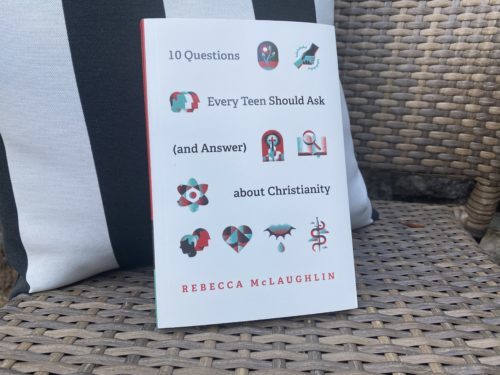 Rebecca McLaughlin holds a PhD in renaissance literature from Cambridge University and a theology degree from Oak Hill College in London. She is the cofounder of Vocable Communications and the author of Confronting Christianity, named Christianity Today‘s 2020 Beautiful Orthodoxy Book of the Year.
Rebecca McLaughlin holds a PhD in renaissance literature from Cambridge University and a theology degree from Oak Hill College in London. She is the cofounder of Vocable Communications and the author of Confronting Christianity, named Christianity Today‘s 2020 Beautiful Orthodoxy Book of the Year.
The post Isn’t Christianity Against Diversity? appeared first on Ever Thine Home.
August 2, 2021
How Does the Holy Spirit Help Me in My Everyday Life?


What should I make for dinner?
I don’t know if I can solve another conflict between my kids. It’s so endless … How I wish I could stop their sibling rivalry for good! It’s so frustrating …
Oh shoot … I forgot to throw the sheets in the dryer before I left to go to my workout. Oh well … I’ve got to remember to respond to that email and post on my Instagram feed when I get home, too …
Should I thaw chicken again for dinner?
Sound familiar? Internal dialogue crowds my mind most days as a woman, wife, and mother. I’m much more likely to think about these practical survival needs than I am to think about the Holy Spirit. He’s not going to tell me what to fix for dinner.
Or might He help me with seemingly mundane requests if I just ask?
The Holy Spirit is our Helper

When Jesus introduced the Spirit to His disciples He used the name “Helper.” Just as we have a name most people know us by, so the Holy Spirit is most often called Helper. In Greek, the word is paraclete, which means comforter, advocate, or counselor. It’s a name with layers of meaning.
On the night of the Last Supper, Jesus was with His disciples, His dearest friends on earth. In the familiar comfort of shared camaraderie, they gathered to enjoy the Passover meal. Bound together by this Jewish tradition and by their loyalty to their Master, they listened once again as He taught them. Though the 12 were unaware, Jesus knew these would be His last moments alone with them, so His final instructions were intensely focused.
Tenderly woven throughout those hours, from Judas’s departure to Jesus’ entrance into the Garden of Gethsemane, are beautiful words of comfort and hope, of deep love and concern for His soon-to-be-devastated friends. He knew paralyzing fear and bewilderment would be theirs by morning. By Passover’s dusk deep grief and lost hope would banish sleep as their minds replayed the nightmare of the Crucifixion.
Jesus knew we, too, would face days or seasons of fear, great loss, and confusion when we have no idea what our next step should be. His eternal words of comfort are for you and me, His disciples today.
He said to them just as He says to us, You will be okay because I will send you the Helper: “Let not your heart be troubled, believe in God; believe also in me” … … “he dwells with you and will be in you” … “I will not leave you as orphans, I will come to you” (John 14:1, 17-18).
Jesus wanted His disciples, and us, to hear His heart of love: I will not abandon you. I will not leave you alone and without help. Like the many times I reassured my little ones, “Mommy will be back. I promise. I will not abandon you.” So Jesus does the same with us. The Helper will be with you forever.
The Helper has history
These were not new concepts for the men and women who followed Jesus. Even nominal Jews, Gentiles, and other nationalities knew the stories of Israel’s famous King David, who was helped by God. David, the author of most of the Psalms, cried out to God, “O Lord, be my helper!” (Psalm 30:10). He also reminded himself and his people, “God is my helper; The Lord is the upholder of my life” (Psalm 54:4) and, “The Lord is on my side as my helper” (Psalm 118:7).
Sprinkled from Genesis to Revelation are a plethora of verses describing the help of the Lord for His people. Here in this graphic is a list of some of the ways God helps us, His people.
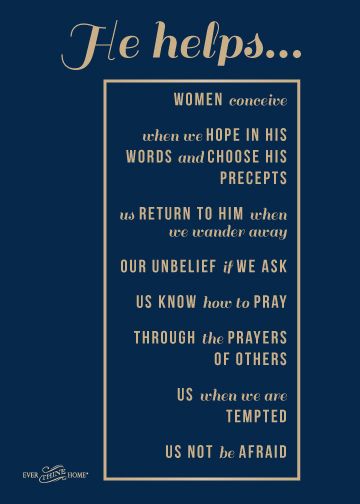
Why don’t we go to Him more quickly?
The God who made us, who watched the sad fall of Adam and Eve, knows we need lots of help. The problem is we usually don’t go to Him unless we are desperate.
Why? Because we have too many ways we think we can help ourselves first.
When I was parenting full time, I eagerly read all the best books on discipline, birth order, how to raise boys, how to raise girls, growing creative kids, and more. When all this advice didn’t work as promised, I often asked friends, or my husband, who didn’t have answers either.
Looking back, my reasons for not asking the Spirit for advice were:
My impatience … I wanted answers now. My fear … I was afraid He wouldn’t reply at all, and I didn’t want the disappointment.My misunderstanding … I secretly believed He was too busy with more important crises in the world than to help me with my kids.My pride … I should be able to handle this, I reasoned.My God was too small and my pride was too big.

Does that describe you too? Do you go online to look for help in parenting or marriage, or read a book, before asking the Holy Spirit for help?
Moms are especially guilty of the shoulds. We think, I should be able to figure this out … I should be able to handle my kids … I should be in a better place in my marriage by now … This shouldn’t freak me out! Believing we should be able is nothing but pride. It’s merely an attitude that says, “I don’t need God’s help for this. I’m depending on self. I can figure it out.”
But we can’t figure it out. We do need His help!
There is nothing wrong with seeking help from books, online content, or even godly mentors. But the Helper wants us to go to Him first. Ask Him for wisdom, ideas, and guidance to the right information.
Thankfully, God does for all of His children what He did with me. He patiently waits for us to realize our need. He knows that we will eventually see that we can’t rescue ourselves, can’t manage it all, can’t be the perfect mom, wife, or friend.
Recognizing I can’t is what the Spirit, our Helper, longs to hear.
Man’s help is more a one-size-fits-all, but God relates to us and helps us as individuals, each unique in His sight. God is intensely personal with us. He gives me what I need, which is different than what you may need.
In our culture, we often believe we are more advanced and much smarter than previous generations. The truth is our hearts and our self-will … the flesh … remain equally depraved and utterly unchanged.
We are still like the children of Israel who ran to other countries for help when threatened by an enemy instead of going to God, their maker and defender. As the prophet Isaiah lamented, “Woe to those who go down to Egypt for help, who rely on horses, who trust in chariots … but do not look to the Holy One of Israel or consult the Lord!” (Isaiah 31:1).
Jesus said it this way: “It is the Spirit who gives life; the flesh is no help at all” (John 6:63). So why would we rely on ourselves or anyone else over the Holy Spirit, who has the answers and help for this life?

What do you need help with?
Have you noticed how much of the Old Testament is about battles and wars? It seems so male focused; it’s not what I deal with as a woman.
But as a mom, many of my days felt like a battle. I had six children whose wills were often against mine.
Oh, how we need the Helper!
But the battle isn’t just with our children. Your marriage is always in the enemy’s crosshairs. Every marriage Satan can destroy creates a tsunami of destruction with children, in extended families, and in our communities. The father of lies has deceived more than one generation into believing children are resilient and divorce is okay because personal happiness is the highest goal in life.
Oh, how we need the Helper!
Complicating both of these battle zones is the internal conflict we women face every day with enemies common to us all: comparison, jealousy, fear, insecurity, feeling unloved or unappreciated or unseen, anger or frustration, feeling inadequate or irrelevant. Add the name of your own place of defeat that drains your life away.
Oh, how we need the Helper.
Our emotions and thinking can be fed by the whispered lies of our enemy. Or our minds and hearts can be fed by our Helper who uses God’s Word to strengthen us, to shield us from enemy fire, to provide solutions to our many needs, to heal us, to remind us of His great love and His ever near presence. He will be your victory!
Psalm 103:14 tells us, “For He knows our frame; He remembers that we are dust.” Because of His great love, He is eager to be our help, every day in countless situations and circumstances if we will ask.
Invite Him into the mundane moments of your days. Talk to Him about everything, even what to cook for dinner, thanking Him for His every provision. As Philippians 4:6 says, “do not be anxious about anything, but in everything by prayer and supplication with thanksgiving let your requests be made known to God.”
The post How Does the Holy Spirit Help Me in My Everyday Life? appeared first on Ever Thine Home.
July 30, 2021
Friends & Family Fridays #7


Dear ones,
It always makes me happy to write to you at the end of each month! Hope you look forward to receiving these “just between us” letters.
This month’s letter includes a story about what God is teaching me, a few photos from July, a fun announcement to share, and a question for you to respond to.
The last four or more years of our lives have been extra challenging. Dennis and I have experienced several difficult relationships in our extended family … we’ve worked through a to-be-expected loss of identity as we retired from FamilyLife leadership … I’ve continued to experience health and sleep difficulties … my mom died … and we are still in a new season of struggle that began last spring. All of these trials, as James the brother of Jesus calls them, have collectively created stress in our marriage too. And that has surprised us, though it shouldn’t have.
Through all of this, what has become clear to me is the unmistakable divisiveness of the enemy of my soul.
I’m reading again, after 20 years, The Lord of the Rings by J.R.R. Tolkien. One scene midway into the book takes place in a throne room, grand and once glorious but now shrouded in darkness and the dust of time. King Theoden, slumped and bent on his throne, speaks little and bitterly as one ravaged by time. Seated below and in front of him on the dais is his advisor and spokesman. Wormtongue is his name.

As I read this name my attention was instantly heightened. C.S. Lewis wrote in his book, The Screwtape Letters, about an apprentice demon named Wormwood. Could there be a connection?
Wormtongue spoke with all proper respect, even with words that rang true, but there was something sly and suspect lying beneath his replies and advice to the king. Two pages later I underlined Tolkien’s words: “After that Wormtongue played dangerously, always seeking to delay you, to prevent your full strength being gathered. He was crafty, dulling men’s wariness or working on their fears as served the occasion.” Over time his advice had turned King Theoden into a feeble and helpless man.
I recognized Wormtongue’s tactics. I knew my enemy was dulling my wariness and working on my fears, too, in our season of aging and difficulty. Tolkien’s words also sounded much like the advice given in The Screwtape Letters to Wormwood by his teacher when he said:
“When two humans have lived together for many years it usually happens that each has tones of voice and expressions of face which are almost unendurably irritating to the other. Work on that. Bring fully into the consciousness of your patient that particular lift of his mother’s eyebrows which he learned to dislike in the nursery, and let him think how much he dislikes it. And, of course, never let him suspect that he has tones and looks which similarly annoy her. As he cannot see or hear himself, this is easily managed.”
We expected our trials of the last few years and we weren’t totally surprised.
Initially.
What has been surprising is the seemingly unending duration and the snippiness that has slipped into our marriage very unexpectedly.
Wormtongue was a man who had surrendered to a powerful evil one who was wreaking havoc in his quest to rule all. Wormwood was a young demon learning to entice humans to surrender to the evil one, Satan. Both represent the two realms of spiritual battle—one in the heavenly places between angels and demons and the other on earth between Satan and God as each works to recruit followers.
It has never been clearer to me that there are only two choices in life. In every decision, in every relationship, in every difficulty, in every season of life, the question is always: Who will I follow? Who will I listen to and obey? Will we choose the evil way or the good and righteous way?
In the spirit of these books by such creative imaginative writers, I’ve decided that in the name of Jesus and for His glory I will resist the attacks of the enemy and refuse to focus on the little things that so easily distract from following Christ alone! If I were a character in the book I’d create a banner to wave or a flag to display that declared my allegiance to Jesus alone. Instead, I’ve had our neighbor build me a cross out of two old 4x4s which we plan to stand in the middle of a flower bed, defiantly declaring where our loyalty lies. Here is my cross ready for a weekend to plant it in its new home.
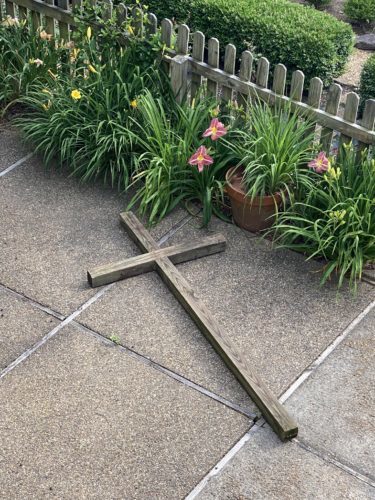
I believe today we need reminders of who our enemy is and what his favorite tactics are. Another book I’ve read this summer is on this topic by a brilliant theologian, Dwight Pentecost, and the title is, Your Adversary the Devil. Three words associated with this being tell us a lot about his character: deceiver, destroyer, and divider. Jesus called him the father of lies and that he was a murderer from the beginning (John 8:44).
I highly recommend this book to you. And it’s a very easy read too.
Changing subjects, I’m particularly pleased to announce I’ve enrolled in Dallas Theological Seminary and am registered for six hours of classes this fall! During the height of some difficult days in late May and early June I decided one way I could push back against the enemy of my soul was to fill out my application. Waiting for more time in my life, waiting for a less stressful time, waiting for any reason other than a pause given by God was giving the enemy an advantage. In defiance of the strife he was stirring I got busy taking steps toward this goal.
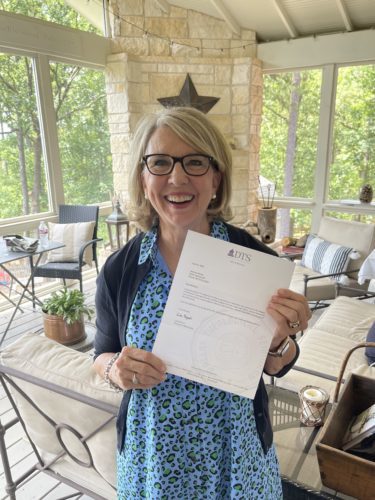
I’m hoping to write snippets of what I’m learning to share with you this fall. I think it will be fun and, I hope, challenging to you to keep learning and growing. And I hope what I learn will encourage your faith as I know it will mine.
Now my question for you is this: What topics would you like me to write on in the blog?
What questions would like answered?
Do you have questions about your faith, about marriage or parenting?
Do you wonder about your teens, relating to adult kids, or do you have questions about in-laws; both the kids your children marry and their parents?
Because we don’t have products to focus on anymore I want to be more consistent in posting and answering Dear Barbara questions. And because we don’t have products for sale we are more than ever dependent on generous donors to keep Ever Thine Home going. It’s truly a new beginning for me and Ever Thine Home in many ways.
The easiest way to reply with your question would be to use the comment button below. I hope to hear how I can help meet your needs in the near future.
My desire is and always has been to encourage, help, and mentor the next generation, and even some of you in my generation, to surrender over and over to Jesus. To follow Him no matter what, and to be as faithful as Habakkuk who wrote, “Yet will I rejoice in the Lord; I will take joy in the God of my salvation” (Habakkuk 3:18).
Welcome August and the next step toward fall.
With love for all of you,
Ever His,
Barbara
The post Friends & Family Fridays #7 appeared first on Ever Thine Home.
July 26, 2021
How Does the Holy Spirit Speak Personally to Me?


Keeping my two grandsons recently, ages 4 and 2 1/2, has reminded me of the perpetual dilemma I faced with my own children: Who started the fight and how can I possibly know the whole truth?
You’ve been there too, haven’t you?
Was it an accident that the younger one hit the older one? Is the older one telling the truth?
I caught the older one in a lie already this week. He’s clearly past the age of three, when all of my six first demonstrated the ability to fabricate lies. I don’t fully trust his story, nor should I. But neither is the younger grandchild all innocence.
Much like my grandsons who knew they’d been caught, once there was a woman who came face to face with Jesus. The woman at the well, described in John 4, wasn’t expecting Him that day. Startled by His physical presence in her women-only space, she became uncomfortable when He spoke to her.
When Jesus began asking questions, this unnamed woman replied with questions of her own to deflect His focus. She asked, “Why?” Then, “How do you know?” Then she delivered a partial truth. Lastly, she changed the subject with flattery before she finally recognized the truth: this man was the Messiah.
Her self-protective strategies remind me of my two preschool grandsons who ask “Why?” a hundred times a day. They don’t ask because they desire truth but because they want their way; they want control. Like the woman at the well, they told me only part of what happened between them. Then the older one finished with a sweet, melt-your-heart voice, “I’ll obey next time, Mimi.”
I recognize this woman’s still-like-a-child nervousness, her telling only partial truth, and her flattery, because it is still in me, too.
Jesus’ presence makes us uneasy because He is perfect and knows all truth. We cannot hide our sin from Him. But hearing the truth from Him does not condemn us. Instead, like this woman, “You shall know the truth and the truth shall set you free.”

After Jesus declared the gift of the Helper who would soon come to be with and in His disciples, He added more clarity, more understanding, by naming Him the Spirit of truth three times. (See John 14:17, 15:26, 16:13.)
The Helper will also be your teacher, Jesus explained. Just as He Himself was Teacher to His disciples and His many followers who had come to depend on His presence, leading, teaching, direction, and correction. Jesus reassured them He would still lead them, but by “the Spirit of truth.”
Jesus’ disciples and followers had come to know His voice, His heart, and the integrity and purity of His every action. He spoke to them verbally and non-verbally. The Spirit also speaks to us verbally using words primarily from God’s written story, the Bible, but also words of truth about Him.
Here are three ways the Holy Spirit speaks:
1. The Holy Spirit speaks by illumining God’s Word. The Spirit is the One who illumines our minds to see truth. Like turning on a light in a dark room, so the Spirit of truth enlightens our understanding. Without His active work in our minds to “open our eyes” we would not see, which is why unbelievers scoff at any reading of the Bible.
Years ago I made a discovery that was life-hanging, a “light bulb moment” as we used to say, about the illuminating work of the Spirit. While doing a Bible study for a class I was taking, I found this verse in the Old Testament: “Observe the Sabbath day, to keep it holy, as the Lord your God commanded you. Six days you shall labor and do all your work, but the seventh day is a Sabbath to the Lord your God” (Deuteronomy 5:12-14). I’d heard this commandment, one of the ten, but on this day the Spirit gave me eyes to see.
I was a tired mom with a bunch of little kids. Every Sunday we made it to church … barely clothed, but always smiling as if we had everything perfectly together! Going to church. Check. Learning about a holy God. Check. Got the first part of the verse right. But the part about a day of rest? Not so much for me as wife and mom. After listening to the words of the verse more, I realized our weekly church attendance was more a historical habit than one of obedience to Scripture.
Dennis and I both grew up attending church every week, so neither of us questioned the practice. Now I wanted to know more. I studied all the verses about the Sabbath and learned several things:
It’s healthy to question why we do and what we do in light of God’s Word. When we follow a pattern without understanding why, it can lead to legalism.I heard God’s heart for me as a woman and a mom. I think He planned the Sabbath for women more than men! I mean that! The old saying, “A woman’s work is never done,” is proof that we need a Sabbath day once a week.Most important, I experienced the Holy Spirit’s personal leading of me, His child. I asked Him how we could practice the Sabbath as a family beyond the Sunday morning hour. He gave me several ideas that helped me, as a mom, actually have a day of rest.I knew this was all from God and not my own imagination because the Holy Spirit gives assurance, a peace, because God is “not a God of confusion but of peace” (1 Corinthians 14:33). He assures us we are doing the right thing or He disturbs us when we are not. His presence affirms the truth within us.
2. The Holy Spirit speaks by teaching all things. I have learned to ask God for all kinds of things that years ago I would have felt were too unimportant to bring to the King of the universe:
When I’ve lost something, I ask the one who knows all things where I’ve left the item. Usually He helps me find it quickly. But not always. I lost a favorite book nearly a year ago and though I’ve asked Him where it is, I haven’t yet found it. He knows its location even though I don’t yet.When I’ve slept terribly at night and have many things to do the next day, I ask Him for strength. Psalm 28:7 says, “The LORD is my strength and my shield; in Him my heart trusts, and I am helped.” I don’t feel instant supernatural physical strength, but He gives me enough to do what is before me. Importantly, His strength isn’t just physical but He also supplies His strength to help me choose what is pleasing to Him on days when I’d rather do what feels best for my tired body. He knows all truth about what my mind and body are experiencing, and I choose to trust Him that He is sufficient.I ask Him to help me focus when I’m distracted because He knows the truth of my heart and my circumstances.When I don’t know what my husband or child is really saying, I ask Him to give me understanding because He knows the truth about their hearts.When someone asks for advice, I try to send a quick prayer for His words to be mine when I reply. He knows what she is really asking.In my work with Ever Thine Home, I am constantly asking the Spirit of God, who was present and involved in Creation, to give me ideas and inspiration, His creative thinking, His new ways of saying eternal truth, His artistic touch on every new product. He knows all truth because He is the Spirit of truth.3. The Holy Spirit speaks by reminding me of Jesus’ words. In John 14:26, Jesus says that the Spirit of truth will “bring to your remembrance all that I said to you.” The disciples had come to believe Jesus was the Messiah, but they didn’t yet understand what was ahead on Good Friday. When someone you love dies, one of your greatest longings is to hear that person’s voice again. Mixed in with grief is the fear that we will forget all that we remember and love.
Jesus knew His disciples would fall into deep grief, become numb in their pain, and begin to forget His words. So He told them in advance that the Helper, the Spirit of truth, would bring to their remembrance all that He taught them.
In order to lose something, you have to possess it first. To remember something, you have to hear and experience it first. The Holy Spirit doesn’t put the words of Jesus into our heads that we have never possessed or heard, though He certainly could. His assignment, as stated by Jesus, is to bring to our remembrance what we have heard, which makes knowing the words of Jesus, the words of the entire Bible, essential.
I once wrote a blog post about hearing God clearly answer a question I asked about aging. His reply to me was simply, “Lay up for yourself treasures in heaven,” from Matthew 6:20. The words weren’t audible, but I heard them as clearly as if they had been. He pulled that phrase and shone His light on it from the memory bank of all I have read.
The Holy Spirit also uses hymns and song lyrics that are theologically accurate to remind me of His truth. Many mornings I wake up hearing the lyrics, “I need Thee, Oh, I need Thee, every hour I need Thee.” My Friend, my Teacher, is reminding me of the truth, As the Word says in Philippians 4:19, “And my God will supply every need of yours according to his riches in glory in Christ Jesus.”

In response, I can declare, “Thank you Lord that you will give me all I need today.”
One morning I woke up hearing the melody, “Jesus loves me, this I know.” I was surprised because I hadn’t heard those words in a long time, and I wondered why the Spirit had given me that reminder.
As my day unfolded, I found myself in a conversation with friends. Instead of feeling comfortable with these people I had known for many years, I felt alienated as the talk increasingly became a discussion about topics I couldn’t engage in. As I sat in silence, feeling out of place and insignificant amidst the happy chatter, I remembered Jesus loves me. He reminded me, “As the Father has loved me, so I have loved you. Abide in My love” (John 15:9).
What an incomprehensible gift the Holy Spirit is to us! He is our Friend, the very best Friend one could have. He is our Helper who comes to our assistance in countless ways. And He is our Teacher who illumines our minds and hearts, speaking truth about Jesus, about ourselves, and about His world!
Ask Him what He wants you to remember and to do. Then thank Him abundantly for every way He works on your behalf.
The post How Does the Holy Spirit Speak Personally to Me? appeared first on Ever Thine Home.
Barbara Rainey's Blog
- Barbara Rainey's profile
- 24 followers





